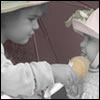One of the nice things about traveling is the ability to experience the different flavors and textures of Jewish life in all kinds of communities.
And so, on a recent trip out of town, I found myself sitting one afternoon at a café with three friends.
This particular neighborhood with a bustling Jewish population has always amazed me, it being a mixture of so many paradoxes and dichotomies. It was an interesting mix of new and old, modern and traditional, big city cosmopolitanism at the same time as small, old shtetl village style.
True to the neighborhood's mosaic, its residents too, though all considering themselves part of this "community," run an interesting gamut of religious commitment and diversity.
And so, over the course of lunch with my friends, natives of the neighborhood, our discussion turned to diversity—its advantages and detriments.
Meira, with her conservative outlook on life, was the first to express her feelings. "I find the diversity in our community problematic. I wish our neighborhood was less diverse. I want my children to attend schools with children from families who have the same value system as mine does. As much as I love this community, I feel it is very confusing to young children to be exposed to so many choices."
It didn't surprise me that Yaakova, who usually has a unique perspective and more open views, disagreed. "It's the diversity that I love about this community. The fact that no one needs to squeeze themselves into a rigid box, that 'everything goes,' that people can choose to express their personal choices and live according to their personal standards—that's what I find so compelling, unique and positive."
I expected Naomi, who usually is very opinionated, to follow along Meira's line of thinking. But she declined to participate in the discussion, wanting instead to get on with our lunch and afternoon plans.
I digested the opinions of my friends. It occurred to me that they were both correct. Diversity can be a boon or a drawback—depending on its cause.
"I think diversity is great for a community," I suggested. "But diversity can only work if there is a definite set of ideals and values that people aspire to, irrespective of what they are personally ready to commit to in their own lifestyles. These ideals need to be clear. But if diversity is simply the default because there is a lack of a value system, it leads to confusion and a lack of clarity."
At this point our tuna melts and veggie wraps were being served and instead of our philosophical ruminations, we all got busy with more practical and relevant matters—the delicious diversity found on our plates.
So, what's your opinion?
When is diversity positive? When does it break the barriers of bland, gray sameness and add flavor to a community? And when does it break down the morals or values of a community and create confusion?






